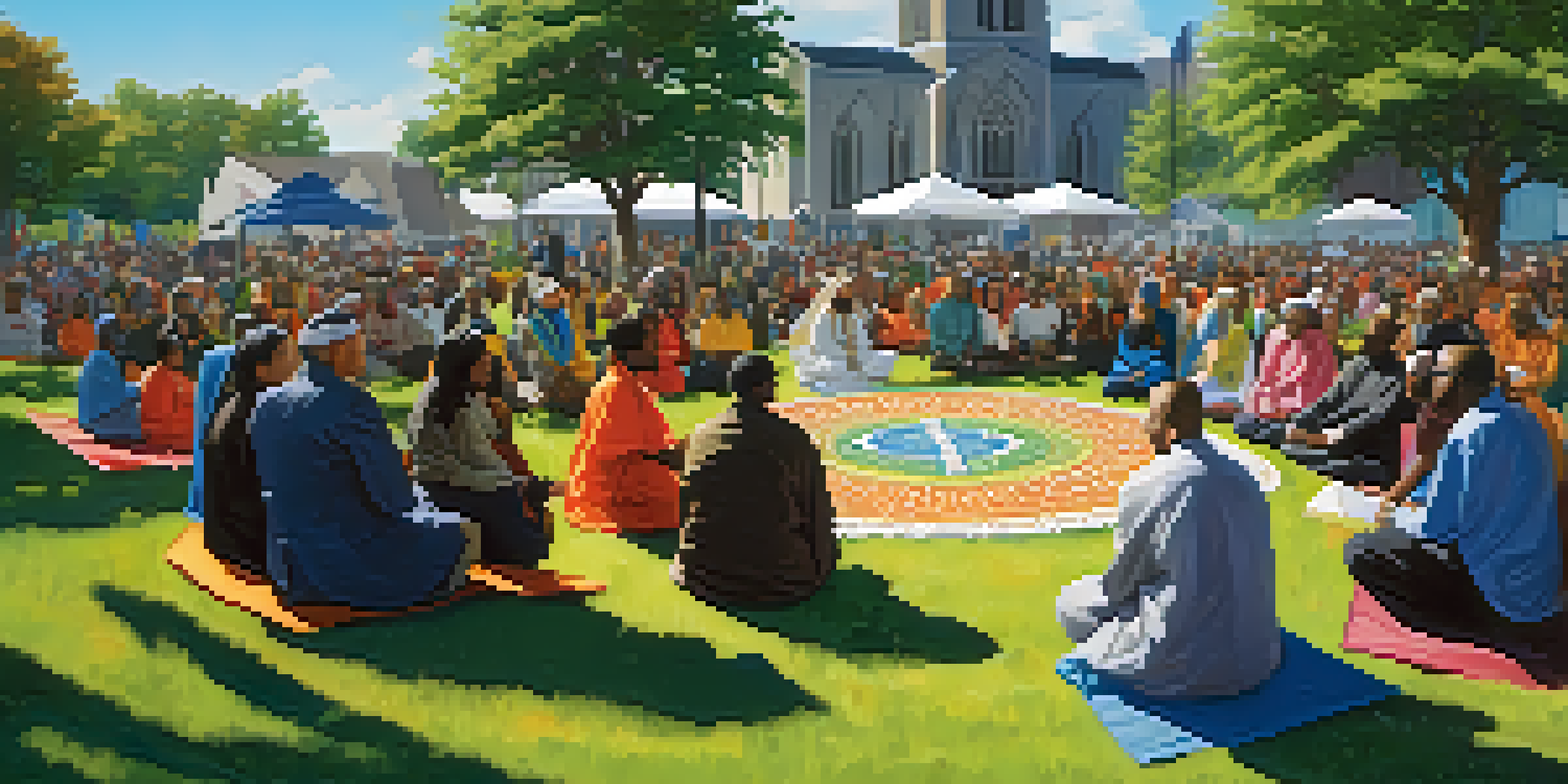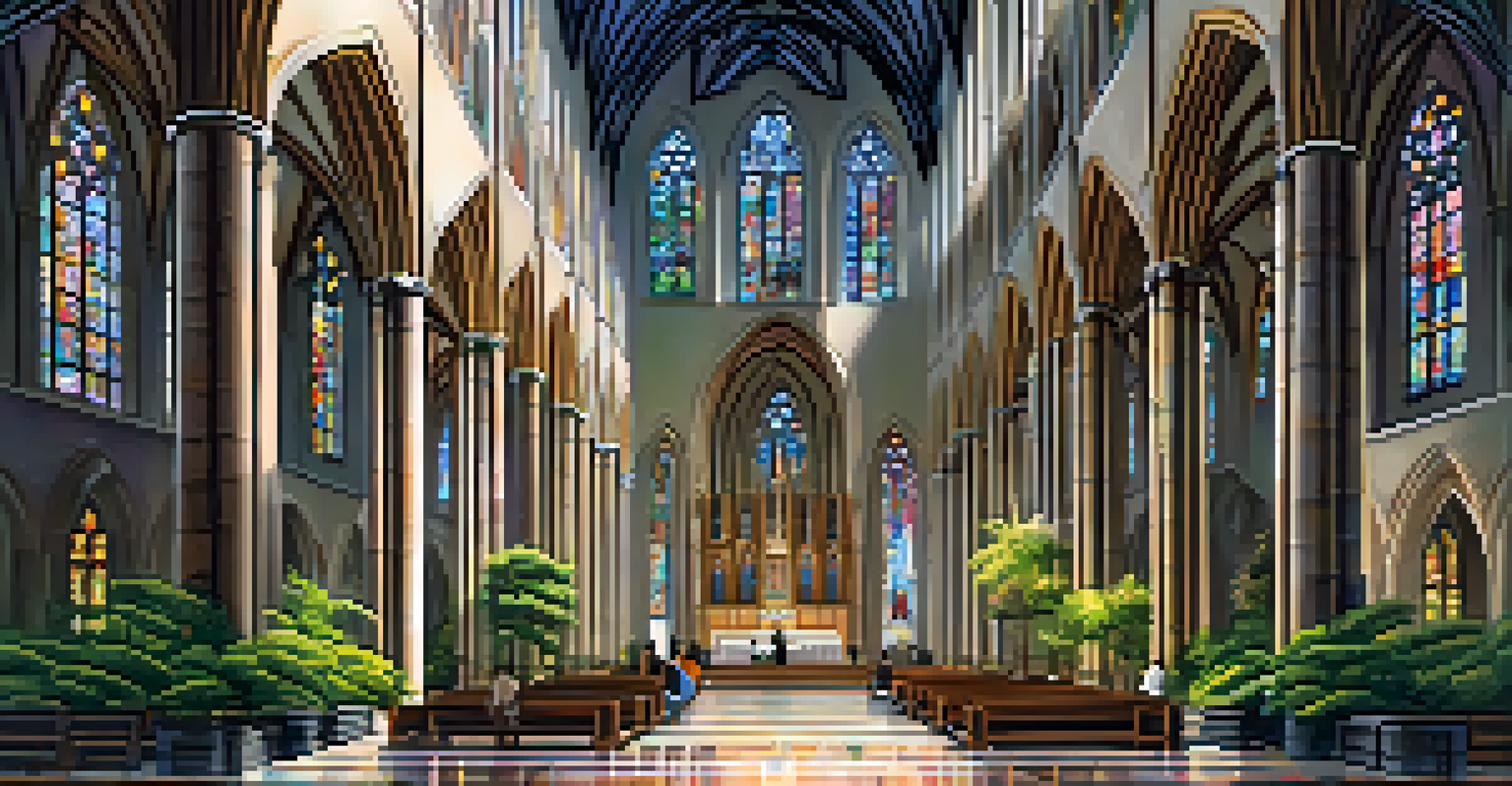Exploring Atlanta's Religious Landscape: A Cultural Mosaic

Understanding Atlanta's Religious Diversity
Atlanta is often celebrated for its rich cultural tapestry, and its religious landscape is no exception. With a blend of traditions from various faiths, the city serves as a vibrant hub for spiritual exploration. From historic churches to modern temples, Atlanta's religious diversity reflects its dynamic population and the myriad beliefs that shape its identity.
Diversity is the one true thing we all have in common. Celebrate it every day.
This melting pot of faiths includes Christianity, Judaism, Islam, Buddhism, and more. Each community contributes unique customs, practices, and festivals that enrich the city’s cultural fabric. For instance, the annual Atlanta Pride Festival not only celebrates LGBTQ+ rights but also highlights the involvement of various religious groups in advocating for inclusivity.
As you explore Atlanta, you'll find that this diversity fosters dialogue and understanding among different faiths. Many religious organizations actively engage in interfaith initiatives, showcasing a commitment to building bridges within the community. This cooperative spirit is a testament to Atlanta's dedication to celebrating its rich religious mosaic.
The Role of Historic Churches in Atlanta
Historic churches are a hallmark of Atlanta's religious landscape, offering insight into the city’s past. One notable example is the Ebenezer Baptist Church, where Martin Luther King Jr. preached and inspired many during the Civil Rights Movement. This church not only serves as a place of worship but also as a symbol of hope and resilience.

Another landmark, the Cathedral of St. Philip, showcases the beauty of Gothic architecture and serves the Episcopal community. Its stunning stained glass windows and serene gardens provide a space for reflection amidst the bustling city. These historic churches often host community events, drawing people together and fostering a sense of belonging.
Atlanta's Religious Diversity
Atlanta's vibrant religious landscape features a blend of faiths, fostering dialogue and inclusivity among its diverse communities.
Visiting these churches allows one to appreciate the architectural beauty and the stories they hold. They are testaments to the faith and dedication of generations that have walked their halls, making them essential to understanding Atlanta's cultural heritage.
Atlanta's Thriving Jewish Community
The Jewish community in Atlanta has a rich history dating back to the 19th century, and it continues to thrive today. Synagogues such as The Temple and Congregation Shearith Israel serve as spiritual homes for many, offering a place for worship, learning, and community engagement. These institutions play a crucial role in preserving Jewish traditions while adapting to contemporary society.
In diversity, there is beauty and there is strength.
Atlanta is also home to various cultural events that celebrate Jewish heritage, including the Atlanta Jewish Film Festival. This annual event showcases films that explore Jewish themes and stories, drawing attendees from all backgrounds. Such festivals not only entertain but also educate, promoting understanding and appreciation of Jewish culture.
Beyond religious observance, the Jewish community actively participates in interfaith dialogue and social justice initiatives. Many organizations partner with other faith groups to address issues like homelessness and racial equality, exemplifying the collaborative spirit that defines Atlanta's religious landscape.
Islam's Growing Presence in Atlanta
Islam is one of the fastest-growing religious communities in Atlanta, with numerous mosques and cultural centers emerging across the city. The Atlanta Masjid of Al-Islam and the North American Islamic Trust are two prominent examples, providing spaces for worship, education, and social activities. These centers cater to diverse Muslim populations from various cultural backgrounds, fostering unity within diversity.
Community events, such as Ramadan iftars and Eid celebrations, invite non-Muslims to join in and learn about Islamic traditions. These gatherings not only promote inclusivity but also break down misconceptions about Islam. Such outreach efforts are vital in creating a more harmonious community.
Historic Churches Shape Culture
Historic churches like Ebenezer Baptist serve not only as places of worship but also as symbols of hope and resilience in Atlanta's history.
Additionally, Atlanta's Muslim community engages in charitable initiatives, exemplifying the principle of giving back that is central to Islam. Organizations like the Georgia Muslim Voter Project work to empower Muslim voices in civic matters, ensuring their representation and participation in local governance.
The Influence of Buddhism in Atlanta
Buddhism has carved a niche in Atlanta's spiritual scene, with several temples and meditation centers offering practices rooted in mindfulness and compassion. The Atlanta Buddhist Center and the KMC Georgia are popular spots for both seasoned practitioners and those new to Buddhism. These centers provide a welcoming environment for meditation and teachings that promote inner peace and self-awareness.
Events like the Atlanta Lantern Festival celebrate Buddhist traditions and invite the wider community to participate in cultural practices. Such festivals not only showcase the beauty of Buddhist art and philosophy but also emphasize the importance of compassion and understanding across religions.
Moreover, Atlanta's Buddhist community actively engages in social justice and environmental initiatives, aligning with the core principles of compassion and interconnectedness. This commitment to social responsibility demonstrates how Buddhism contributes to Atlanta's diverse religious landscape.
Christianity's Diverse Denominations in Atlanta
Christianity remains the predominant faith in Atlanta, encompassing a wide array of denominations. From African Methodist Episcopal churches to Southern Baptist congregations, the city is home to a vibrant spectrum of beliefs and practices. Each denomination brings its unique flavor to the spiritual landscape, contributing to a rich tapestry of worship experiences.
Mega-churches like Passion City Church and North Point Community Church attract thousands of worshippers, while smaller congregations offer intimate and personalized services. This diversity allows individuals to find communities that resonate with their spiritual needs, fostering a sense of belonging.
Interfaith Initiatives Promote Unity
Interfaith initiatives in Atlanta encourage collaboration and understanding between different religious groups, enriching the community as a whole.
Moreover, many Christian churches are deeply involved in community outreach and service projects. Their commitment to social justice, education, and poverty alleviation reflects the values of their faith, demonstrating how Christianity plays a pivotal role in shaping Atlanta's cultural and social fabric.
Interfaith Initiatives: Bridging Differences
Interfaith initiatives have gained momentum in Atlanta, fostering dialogue and collaboration among various religious communities. Organizations like the Interfaith Children's Movement work to unite people of different faiths in service to children and families in need. Through joint efforts, these organizations promote mutual respect and understanding, breaking down barriers between communities.
Events such as the Atlanta Interfaith Institute bring together leaders from diverse faiths to discuss pressing social issues and find common ground. These gatherings provide a platform for sharing ideas, experiences, and challenges, demonstrating that despite differing beliefs, many values align across faiths.

By championing interfaith engagement, Atlanta sets an example for other cities striving for harmony in diversity. These initiatives not only enrich the spiritual lives of participants but also contribute to a more inclusive society where everyone feels valued and heard.
The Future of Atlanta's Religious Landscape
As Atlanta continues to grow, its religious landscape is poised for further evolution. The city’s increasing diversity brings both challenges and opportunities for faith communities. Adapting to changing demographics and fostering inclusivity will be key for religious organizations looking to remain relevant and engaged.
Emerging trends, such as the rise of spirituality beyond traditional religious frameworks, are shaping a new generation's approach to faith. Many younger individuals seek community and connection while exploring beliefs outside conventional structures, prompting established organizations to rethink their outreach strategies.
Ultimately, Atlanta's religious landscape will likely continue to reflect its dynamic population, with an emphasis on collaboration, understanding, and respect. By embracing diversity and fostering dialogue, the city can create a future where every faith is celebrated, and every voice is heard.